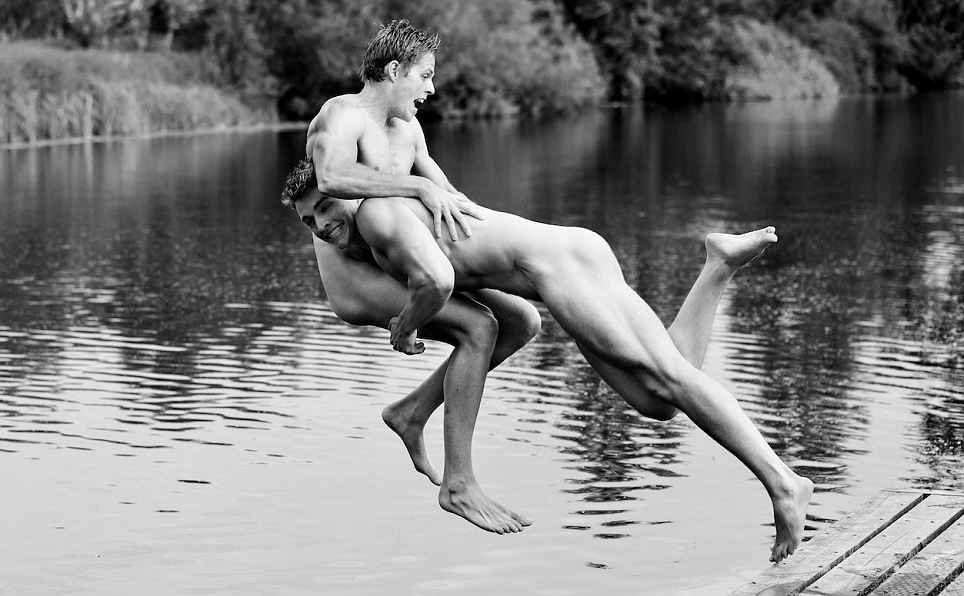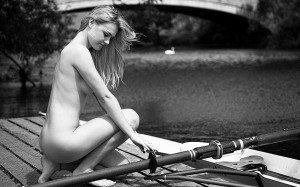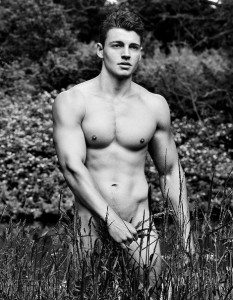Phw-oar! What a calendar!
One of the unavoidable facets of life is that sex sells. Whether it’s a picture of a naked woman straddling a coca cola can or some ridiculously muscular guy flexing his muscles in time to the musical beat of a perfume ad, barely decent images of sexy people tend to sell like a panacea for life’s ills. Considering this, it’s not very surprising that our very own Warwick Rowers naked calender has been selling like mad, but not all of the money raised is going to keeping the corporate machine turning.
Last week I had the chance to interview some of the sexually attractive and proactive people who managed to make the calender a reality about the Sport Allies project, a charity they want to start that combats homophic and transphobic bullying. Lauren, a fourth year engineering student who runs the Sport Allies project, Laurie, a second year politics student who modelled and took charge of the calender, and Phil, a third year history student who also modelled and “helped out with the posting,” were kind and patient enough to answer some of my questions in the middle of a crowded Curiositea.
Can you tell me a little about the project, about Sport Allies and the Calendar
Laurie: I’ll start with the calender because that came first. In June we all went down to the boat house for a couple of days and shot all the calender shots, all naked as mates together
Phil: it was a really weird experience, I’ve definitely never had that before. It was quite good fun actually, everyone was sort of getting into the mood
The mood of getting naked with all your friends
Laurie: [laughing] Yeah, if you don’t sort of get into it and laugh then you feel awkward and it just doesn’t work. You have to feel comfortable. Because we’re all friends it was quite easy to get that atmosphere.
Can you tell me a bit about Sport Allies?
Lauren: Okay, so last year we supported a charity called the Ben Cohen foundation, which is a charity to help combat homophobia. This year we’re going one step further and setting up our own. It’s not yet a charity, but we hope it’ll ultimately become one. We’re currently working with Ernest and Young to create a business model to outline financial details, and we’re with a charity called EACH: educational action combating homophobia.
Laurie: One of the top four accountancy companies in the world asking to come and help us make Sport Allies is just wonderful.
Lauren: There’s two aspects of the Sport Allies project. Part of it is going into schools and sports clubs and creating awareness. We’re going to be doing that by getting workshops with the charity EACH. Another part of it is tackling internal homophobia and transphobia. We figured if we’re going to be a club that represents inclusiveness then we need to be a model for that, so we’re bringing out a code of conduct that we want everyone to sign, we’re going to have a diversity and inclusivity rep on the exec, things like that to make sure we’re a model club. After that we want to expand it to other clubs and other Universities.
We’re going to have a website that tells the story about how the calender was created, how the market came about and how the guys are now with homophobia.
Do you think that idea of inclusivity might be easier in a University environment with all these people from all over the world? Do you think you can expand that into the real sporting world?
Laurie: We’re looking to create with EACH viral content. We can’t go to America and do the physical work, so we want to make viral content so that people who believe they’re in trouble can go and find local helplines or centres to call. As much as we’d love to, we can’t be everywhere, so we’re looking to drive people who are vulnerable or bullied to find local charities where they can seek advice and support.
What was the deciding factor in selling the calender outside the uni?
Lauren: [laughing] the market was there.
Laurie: it started off in the first three years with just selling it on campus to family and friends. And then in the fourth year it took off online, we sold it through the club website and sold out within days. It’s taken on a life of it’s own. I mean the guys who started all this probably didn’t ever think we’d be on Good Morning America or The Daily Mail or Buzzfeed. It’s just grown every year.
Yeah, I’ve seen articles everywhere about it, you guys were even on tv with E! Entertainment. How does it feel to be part of what is quickly becoming an international phenomenon?
Laurie: It was quite… bizarre. My sister recorded the E! clip. They were talking about Prince George, then they went to us, then to like Kanye West’s baby. Kanye West’s baby? We really shouldn’t be in between those two stories. It was obviously quite flattering and I think it speaks volumes about what we’re trying to do with Sport Allies. Every University makes naked calenders, but I think the real attraction we get is because people think what a great idea Sport Allies is, and I’m very proud to be associated with it.
Being part of a gender or sexual minority group, especially in a sports environment, can be really hard, and a lot of LGBTUA+ people, myself included, are grateful for what you’re doing (in more ways than one). But what do you think of people who might say you’re trivialising the matter by just stripping off, or who think that because the majority of you are straight girls and guys, it makes what you’re trying to say less meaningful?
Lauren: I think a big aim of the charity is about tackling homophobia, but it’s more than that, it’s about being proactive rather than reactive. It’s about providing resources and help to people who are questioning their sexuality. But also it’s about creating awareness and an environment where it’s okay for people to not be heterosexual before it becomes an issue, and that’s why we’re targeting a young adult age group.
Do you think in sport homophobia and transphobia might be an issue that needs to be looked at more?
Laurie: I think that sport’s a good area to target it. I mean a sporting environment is where a lot of social skills are developed, at school or on your Sunday football team or whatever. It’s how a lot of young people interact. And if there’s a social problem like homophobia or transphobia, it’s going to take place in a social environment like that. We’re sports people, so we’re treating it as sort of tackling the problem on home turf. If we can target homophobia there, then maybe it can spread beyond sport to wider circles.
What did you each personally get from the experience? And what were your reactions to it all taking off?
Phil: I didn’t really know what I was expecting, but I certainly wasn’t expecting so many articles about it. Now wherever I look I can’t escape pics of naked Phil. I definitely wasn’t expecting that, but it’s good it’s out there and raising awareness.
Laurie: I think aside from the kind of media hype and all the jokes, what I’ve taken away from it so far is that I’ve learned a lot about homophobia and problems in society and attitudes, both wrong and right, to bullying, homophobia and equality. So, for me, I’ve really appreciated being able to meet a lot of LGBT people and learning more.
Lauren: Also, there’s about ten people in the post office right now just posting calenders. It’s brought everyone together. Everyone’s got a common goal and we’re all working to make a project the success.
Phil: Yeah, I mean we spend pretty much all of Sunday afternoon sitting in Laurie’s flat, fifteen or twenty of us, writing addresses on all these calenders with a big screen with all the supportive messages from the twitter feed.
Have you had any negative messages?
Laurie: I saw one tweet along the lines of “it’s like trying to treat diarrhoea by eating more fibre” or something? It was quite wacky. I think the point was that because we were stripping off… actually I don’t really get what the point was, but it was negative. That’s the only one I’ve seen.
So has the club as a whole learned more about homophobia?
Laurie: Yeah! Well I mean, just on Sunday when we were sat posting and we were asking people to send their messages of support to the guys, we were seeing people send in not just that they loved what we were doing but why. How they were being bullied or what for, how they were excluded. That in itself was a great educational experience for everyone there, because we saw not just that homophobia takes place but why and how and where and when, and that helps us understand what needs to be doing.
We went to a club called Aura where about 500 gay men bought tickets to get their calender’s signed, and we spent four hours just talking to the guys and hearing their stories about what they thought needed to be done, how they’d been treated. On a personal level it’s been a fantastic educational experience. Hopefully that education will help the club and the project make more of an impact than it would otherwise.
Would you do it again?
Phil: [laughing] got one more year here. As long as I don’t get too fat in the meantime.
Lauren: Yeah, definitely.
Laurie: yeah I’d do it again. I might not run the project again, it’s taken over my life a bit, but I’d definitely do the calender again and get involved in Sport Allies in any way possible, both as a student and as an alumni.
To wrap it all up, what’s your favourite month?
Phil: I can’t even remember what the pictures were.
Laurie: [chuckling] I think it’s August, but I like that one because it’s me tackling Paddy into the water.
Okay! Well thank you, both for this interview and for what you’re doing. It genuinely means a lot to me and others like me.
The Making of Warwick Rowing’s Naked Calendar (because we know you want more!):



Comments (3)